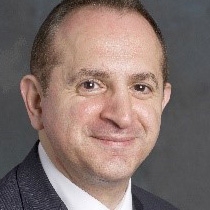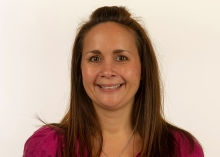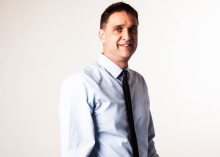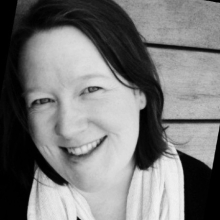
The School of Dental, Health and Care Professions offers exceptional health, dental and social care education to meet the current and future needs of the health, dental and social care sectors.
Within the school we explore a number of health sciences. We offer comprehensive oral and dental healthcare to the public and alongside this we help to train a larger health and care workforce of paramedics, dental nurses, dental hygienists, dental therapists, adult nurses, mental health nurses, radiographers, physiotherapists and operating department practitioners.
The videos below showcase the two former schools that combined to become SDHCP.
Welcome to the School of Health and Care Professions
Take a tour of our Health and Care Professions facilities at the University of Portsmouth, where we teach Nursing, Diagnostic Radiography, Paramedic Science and Operating Department Practice.
A video showing highlights of studying in the School of Health and Care Professions at the University of Portsmouth - showing simulated ward space, x-ray facilities and paramedic science facilities. (No dialogue.)
Welcome to the Dental Academy
Take a tour of our Dental Academy at the University of Portsmouth, where we teach Dental Hygiene, Dental Therapy and Dental Nursing courses
A video showing highlights of studying in the Dental Academy at the University of Portsmouth - using phantom heads and live patient clinics, develop your practice with x-ray machinery, fillings, scaling and impressions. (No dialogue.)
Teaching
Our undergraduate and postgraduate degrees cover all major aspects of healthcare and dentistry, providing an educational platform that bridges the gap between science and application – so our students graduate with the skills required to succeed, and an understanding of how to use them.
We follow the core values of the NHS with an emphasis on practical teaching so our students can start treating patients – under the close supervision of qualified staff – early in their studies. We also support our students through a personal tutor system and on some courses, using an app-based longitudinal assessment method to track students clinical progress and provide continuous feedback.
A number of our courses make our students eligible for registration with other professional bodies – such as the Health and Care Professions and General Dental Council or are endorsed by Skills For Care.
Our teaching areas
From dental nursing courses to radiography and paramedic science degrees. Explore what we have on offer below.
Healthcare and social care courses
The world needs healthcare and social care professionals – and our courses can help start your exciting career in the field.

Dental Academy short courses and CPD
Browse our Portsmouth dentistry short courses and book your place.

Outreach
The Dental Academy delivers outreach activities, including offering free dental health services to the public, during which our dental nurse, dental hygienist and dental therapist students gain valuable professional experience.
Our preventative and educational work in the community also gives students a better understanding of the social impact of good dental care – with our students regularly involved in our schools Brush Up programme and our work with the homeless community.
Research
Our research is focused on delivering evidence-based health care to our patients and the community, on improving the quality of dental education, and in the area of clinical innovation and dental materials.
In our submission to the Research Excellence Framework 2021 (REF 2021), our research achieved notable recognition.
Within Allied Health Professions Dentistry Nursing and Pharmacy, 90% of research was rated as world-leading or internationally excellent in terms of originality, significance and rigour and 100% of the Impact Case Studies were rated as very considerable in terms of their reach and significance.
Partnerships and funding
We've received funding from a number of organisations, including:
- The National Institute for Health Research – the largest national clinical research funder in Europe
- Medical Research Council
- NHS England Workforce, Training and Education
- Health Education England
- Newton Foundation
- Academy of Dental Excellence
- Portsmouth City Council
Our global team of postgraduate researchers, research associates and research clinicians are working on various domains within healthcare and dentistry, some of which can be explored below.
Our areas of expertise
Dental public health
We undertake research relating to promoting health, preventing disease and how to facilitate access to high quality dental care for all.
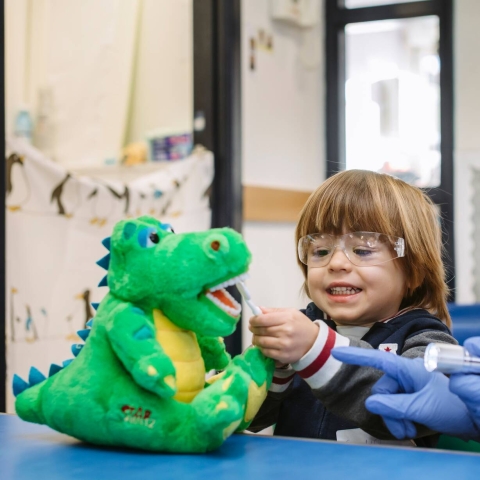
Dental education
We're focusing on the development and evaluation of education for the dental team, and working to develop new operative and learning tools for dentistry.
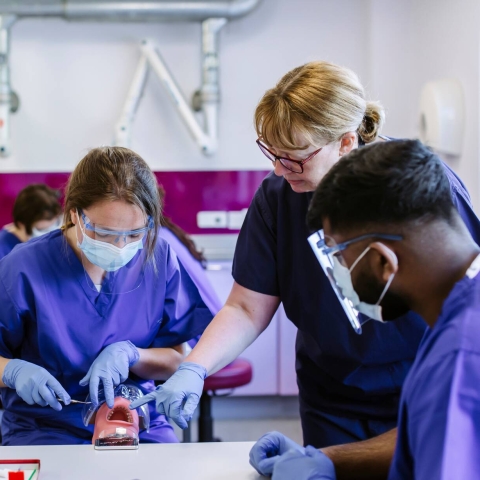
Clinical innovation
We're conducting studies that consider and test advanced clinical and diagnostic techniques, efficient models of clinical care, and novel clinical materials.
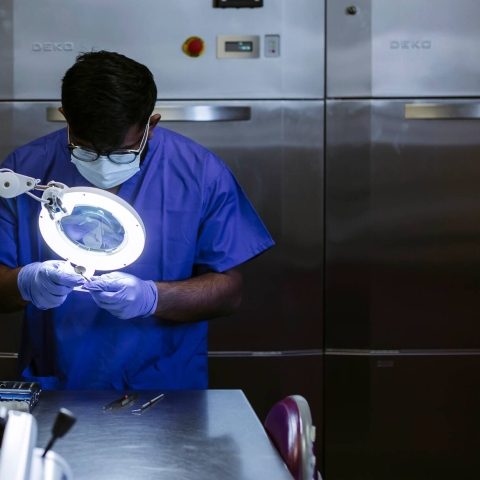
Our research projects
-
A tailored intervention to improve pressure-ulcer prevention for housebound older people and their carers
Led by Dr Jenny Roddis. A co-designed, theory-informed, tailored intervention to support housebound older adults at risk of pressure ulcers and their lay carers to adopt effective prevention behaviours, informed by survey and stakeholder input to improve real-world uptake and outcomes.
-
INSPIRE Portsmouth for MRC: Integrating Support for Public Involvement in Research at Portsmouth for the Medical Research Council
Led by Dr Amy Drahota. University of Portsmouth–led, MRC-funded scheme supporting researchers to develop high-quality health research proposals through strengthened public involvement, with a focus on inclusion, equity, and engagement with underserved communities.
-
Impact of sugary and acidic foods on modifying acquired salivary pellicle and dental erosion
Led by Dr. Mahdi Mutahar. This project explores how sugar and acid in foods interact with saliva and enamel pellicle, examining factors like pellicle thickness, salivary proteins, and how well the pellicle layer protects against erosion.
-
Improving Oral Health of People in Portsmouth
Led by Dr Carolina Machuca Vargas and Prof Chris Louca. Project delivering community-engaged oral health education, prevention, and outreach in Portsmouth, led by the University of Portsmouth Dental Academy in partnership with the local authority, to improve access to dental care and oral health outcomes for vulnerable and underserved populations, including children and older adults.
-
Using intraoral cameras within a supervised toothbrushing programme in primary schools in Southeast England: the TeleBrushUP Programme
Led by Dr Carolina Machuca Vargas. This project investigates the integration of intraoral cameras into the University of Portsmouth Dental Academy’s Brush UP programme, a supervised toothbrushing initiative in primary schools.
Facilities
Our facilities train students in a variety of clinical environments, allowing them to hone their skills.
Our dental facilities train students in practice teams using modern clinical facilities that replicate those found in real NHS dental practices. Students can access live teaching clinics that have treatment bays replicating the set-up of a dental surgery and can work together in small teams.
At Portsmouth, we have a Dental Academy that offers a number of patients services.
Please visit our page on the NHS website to find out if we're currently accepting patients.
Within our healthcare facilities, students can use our Centre for Simulation in Health and Care facility to develop their diagnostic, clinical assessment, clinical decision-making and leadership skills through practical experience and guidance.
Our staff
Explore our faculty
Explore the other Schools and Departments that make up our Faculty of Science and Health.
School of Psychology, Sport and Health Sciences
Discover the School of Psychology, Sport and Health Sciences, where we're exploring health and exercise science, sport science, and the impact of psychology.

School of Medicine, Pharmacy and Biomedical Sciences
Through our teaching and research, the School of Medicine, Pharmacy and Biomedical Sciences strives to find new ways to help those with debilitating illnesses and diseases.

Faculty of Science and Health
Explore the Faculty of Science and Health at the University of Portsmouth, and learn more about the teaching and research activities that take place within the Faculty's different departments and schools.

Contact us
To get in touch, please contact our Admissions office.

